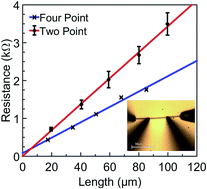Direct contact four-point probe characterization of Si microwire absorbers for artificial photosynthesis
Abstract
We present a facile approach that achieves four-point electrical characterization of silicon microwires fabricated using a bottom-up vapour–liquid–solid process. Tungsten probes are brought into direct contact with silicon microwires using piezoelectrically driven probe actuators. This technique can be applied to silicon microwires without the need for high-temperature lithographic preparation or the additional use of In/Ga to ensure reliable electrical contact between the probe and the wire. Comparison between two-point probe and four-point probe measurements demonstrates the robustness of the four-point approach. Significantly, the four-point characterization technique is not impacted by native oxides at the microwire/tungsten probe interface. The four-point technique can be applied to sense electrical responses in half-cell and full-cell representations of artificial photosynthesis systems, regardless of catalysts or functional groups attached to the microwire sidewalls.



 Please wait while we load your content...
Please wait while we load your content...